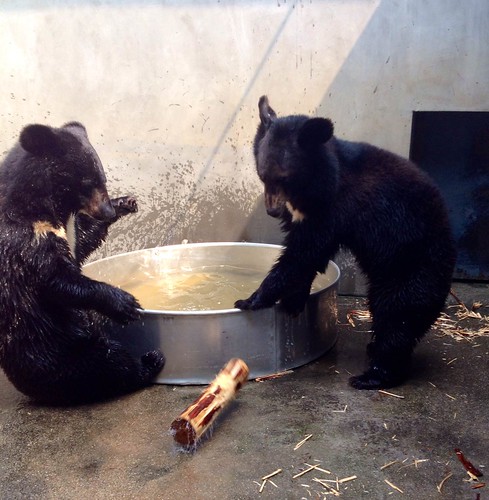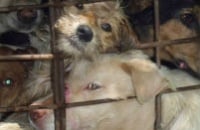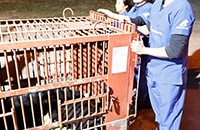Safeguarding the future of the Nanning bears
11 December 2015
It’s been a year of hard work and frustration for Animals Asia in the fight to secure a future for 123 bears at a former bear bile farm in Nanning, China.
Animals Asia took over the farm in April 2014 after the owners said they believed there was no future for the bear bile industry. As there are no other charities rescuing bears in China, without Animals Asia there was every chance that the bears would have ended up slaughtered or sold to other bile farms or circuses.
Originally the plan had been to move 30 of the bears to Animals Asia’s Chengdu Bear Rescue Centre – freeing up space to pull down the bile farm and turn the area into a sanctuary. However with continued sensitivities around the bile industry hampering the granting of transfer permits, the knock-on effect has meant ongoing delays.
Now, a development company has partnered with local government and entered into a buyout of the land. This had made any development by Animals Asia impossible and has also further complicated the permit process.
However, it is anticipated that once the purchase is complete, all the bears will be able to move back to Animals Asia's Chengdu sanctuary. In the meantime – Animals Asia is pushing for the release of several bears that need medical care that can only be provided in Chengdu.
Animals Asia founder Jill Robinson said:
“We are working hard with the authorities to resolve this issue and hope to have the first group of bears joining us at our sanctuary in Chengdu early in the New Year.
“When you are talking of helping this number of bears then nothing comes easily and while patience may occasionally be in short supply we are optimistic that they can be moved soon. We are working towards - and believing in - a happy ending for these bears.”

Meanwhile without being able to change the structure of the old bear farm - Animals Asia staff have been challenged by these limitations to create the best possible environment for the bears as they wait out the delays.
The bears are stationed to either side of a central hallway. What were once bile extraction cages are at the front of each cell and there are sleeping spaces behind. While far from ideal - the relative space afforded to the bears does at least give the team something to work with.

Animals Asia China Bear and Vet Team Director Nic Field explained:
“We wanted from the outset – from literally day one – to turn around the lives of these bears. So we started by changing their diets and ensuring they always had enough water - even digging a well. We brought in pressure washers to clean what were rancid cells and tried to make them more like dens where the bears can have some comfort. They now get the same food that our Chengdu bears do ensuring optimum nutrition.
“On top of that there’s been a greater emphasis on keeping these bears’ minds occupied with what we call environmental enrichment such as toys and puzzle feeders. The team have been planting banana trees at the farm so that we can use their leaves as ‘browse’ for the bears – greenery they can choose to play, eat or nest with.
“Each bear also enjoys a paddling pool which helps cool them down during the summer months as well as give them somewhere else to play. Hose pipe soakings bhave become a regular summer treat, with the bears also getting frozen fruit popsicles that they can lick to get at the treats inside.
“The difference between what this place was then and now is like night and day. Now the bears are happy and inquisitive and healthy from better diet and care. They’ve something to look forward to each day now.”
On top of this transformation - all the adult bears have been health checked and corrective surgery has been carried out to help on the likes of rotten teeth, in-growing nails and other health issues, to ensure the bears are living without pain. For bears that once suffered bile extractions the plan is to remove their gall bladders once they can be moved to the sanctuary.
Additionally for the younger bears, the team has been able to integrate several into pairs, this process is ongoing and will give them happier and more meaningful lives.
Jill Robinson added:
“We took on these bears because we couldn’t walk away. We’ve built up decades of experience in rescuing farmed bears in China and Vietnam, and have seen them becoming happier and healthier as a result of our care. There is so much more to come for these bears, and again we have no doubt that our patience will eventually see them outside in our enclosures living a life they enjoy.”
Key to the standard of bear care has been work with on-site staff. Under the direction of Animals Asia staff, former farm hands have been retained and re-trained in the required approach to animal care and animal welfare principles.
For one bear - Smudge, the last cub born on site - this is the only home she has ever known. But, with up to 30 years of life ahead of her, Animals Asia staff are hoping that the days when she can enjoy open spaces and sunshine are not too far away.
BACK







 5 reasons the dog meat trade must end
5 reasons the dog meat trade must end
 New year, new home for Christmas the Bear!
New year, new home for Christmas the Bear!
 Veterinary welfare training – pain management
Veterinary welfare training – pain management